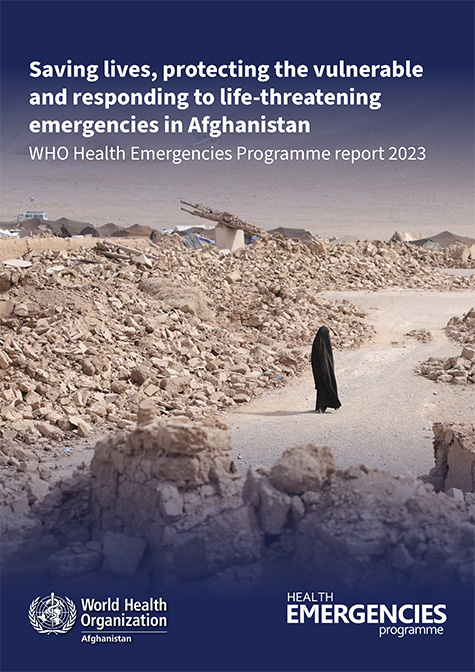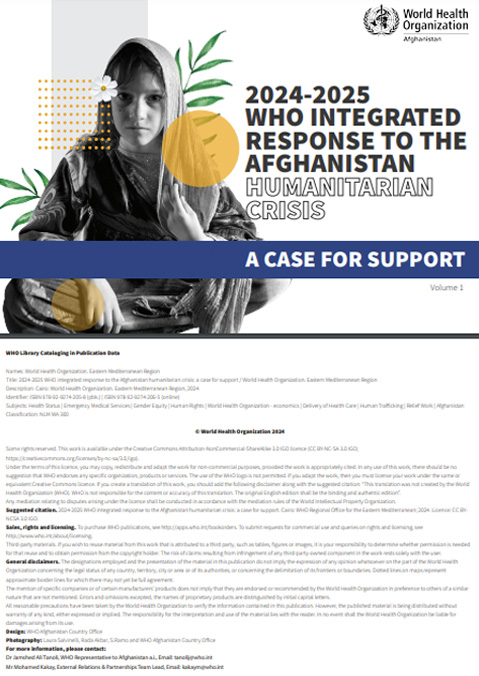 HE Dr Abdullah Abdullah, Chief Executive, complimented the contribution of partners to fight against tuberculosis (TB) in Afghanistan Kabul, 27 March 2018 - Chief Executive of Afghanistan HE Dr Abdullah Abdullah, HE Minister of Health, Dr Ferozudin Feroz and HE Minister of Women’s Affairs Delbar Nazari, representatives of WHO, United Nations Development programme and other United Nations agencies, USAID, Japan International Cooperation Agency (JICA), the Stop TB partnership and senior Afghan officials commemorated 2018 World Tuberculosis Day with an event held in Kabul on 27 March 2018.
HE Dr Abdullah Abdullah, Chief Executive, complimented the contribution of partners to fight against tuberculosis (TB) in Afghanistan Kabul, 27 March 2018 - Chief Executive of Afghanistan HE Dr Abdullah Abdullah, HE Minister of Health, Dr Ferozudin Feroz and HE Minister of Women’s Affairs Delbar Nazari, representatives of WHO, United Nations Development programme and other United Nations agencies, USAID, Japan International Cooperation Agency (JICA), the Stop TB partnership and senior Afghan officials commemorated 2018 World Tuberculosis Day with an event held in Kabul on 27 March 2018.
Speaking at the event, HE Dr Abdullah Abdullah, Chief Executive, complimented the contribution of partners to fight against tuberculosis (TB) in Afghanistan, and commended the achievements gained under very difficult circumstances.
He stated that “we have to take all the possible initiatives to combat TB” and emphasized the importance of awareness-raising, noting that communities “can contribute to end TB by accessing health care early for diagnosis and adhering to complete the treatment course. This will also prevent emergence of multidrug-resistant TB”.
HE Minister of Health Dr Ferozudin Feroz stated in his address that “we cannot End TB with the efforts of Ministry of Public Health only; there should be a multisectoral approach to combat TB in the country. Integration of TB care in the health service delivery package has showcased tangible outcomes in TB control. It is important to reach all the people in the country through universal access to health care.”
Despite significant progress over the last decades, tuberculosis (TB) continues to be ranked among the leading causes of death and one of the top infectious killers worldwide, claiming over 5000 lives a day. The emergence of multidrug-resistant TB poses a major threat to health security and could risk gains made in the fight against TB.
In 2016, worldwide there were an estimated 10.4 million new TB cases, and 1.8 million people died from the disease. In Afghanistan, there 65 000 new cases and 11 000 deaths were estimated in the same year.
 WHO representative in Afghanistan, Dr Richard Peeperkorn (left) commended the positive development in the detection of TB casesIn his speech, WHO representative in Afghanistan, Dr Richard Peeperkorn commended the positive development in the detection of TB cases. “The Afghan health sector is increasingly effective in detecting tuberculosis. In 2017, the National TB Programme reported 47 406 cases. Compared to 2016, there was a 10% increase, a significant improvement.”
WHO representative in Afghanistan, Dr Richard Peeperkorn (left) commended the positive development in the detection of TB casesIn his speech, WHO representative in Afghanistan, Dr Richard Peeperkorn commended the positive development in the detection of TB cases. “The Afghan health sector is increasingly effective in detecting tuberculosis. In 2017, the National TB Programme reported 47 406 cases. Compared to 2016, there was a 10% increase, a significant improvement.”
He further reiterated WHOs ongoing work to help Afghanistan fight the disease. “WHO continues to support the National TB programme by providing technical guidance, and ensuring an adequate supply of quality assured anti-TB medicines and diagnostics in collaboration with the Government of Japan”.
“To end tuberculosis, we need to ensure strong political commitment and appropriate financial and human resources. World TB Day provides an opportunity to shine the spotlight on the disease and mobilize political and social commitment to accelerate progress to end TB”, Dr Peeperkorn said.
For more information, contact:
Dr Supriya Warusavithana
WHO Afghanistan Programme Manager (Communicable diseases)
Phone: 0782 200 350
Email:
This e-mail address is being protected from spambots. You need JavaScript enabled to view it













